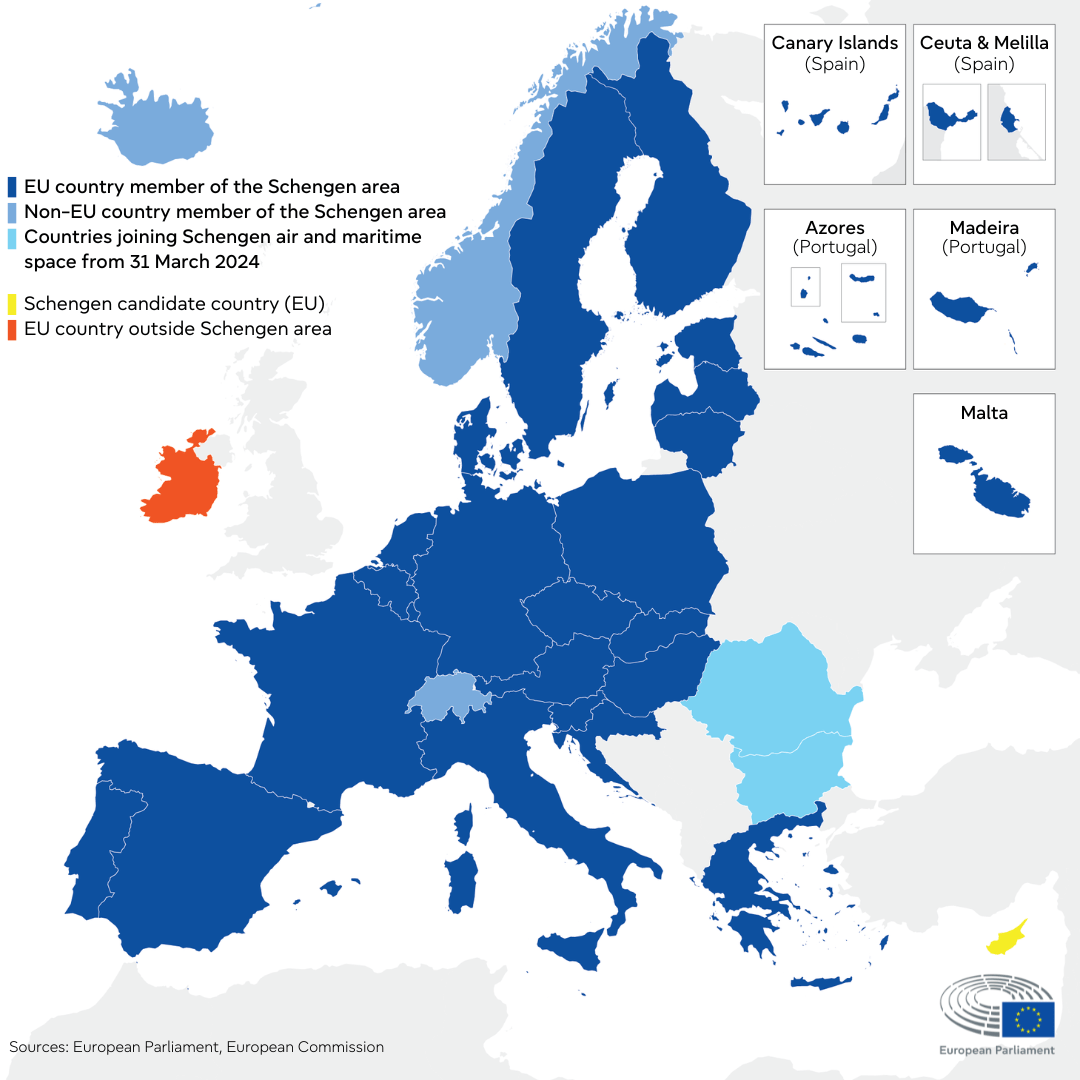Schengen Area
Thématiques
Date de mise à jour
The Schengen Area is an area within which people may move freely between countries that are signatories to the Schengen Agreement.

Area of free movement
Once any individual, of whatever nationality, has entered the territory of one of the Member States, they may cross the borders of the other States without any controls at internal borders within the Schengen Area.
Controls only apply at external borders when foreign nationals first enter the Area.
The fact that France belongs to the Schengen Area means authorized foreign nationals can enter France and move freely between countries in the Schengen Area for up to 90 days in any 180-day period.
Within the Schengen Area, businesses and foreign nationals thus benefit from:
- Harmonized conditions of entry and issuance of short-stay visas.
- Abolition of internal border controls.
- The principle of free movement of persons within the Area.
Schengen countries
French territory within Europe (i.e. excluding overseas départements, territories and communities) has been part of the Schengen Area since the latter was first formed.
All EU, EEA Member States and Swiss are also part of the Schengen Area. Since 1 January 2025, Romania and Bulgaria have been fully integrated into the Schengen area. Cyprus does not belong to the Schengen Area.
Helpful tip: you want to enter France? Several types of visas are available to you, pursuant to your personal and professional situation and the reason for your stay. Consult our fact sheet « Visa ». Please note that a visa issued by the French authorities also offers the opportunity to access the territory of the 29 member states of the Schengen area.
To respect the length of stay in the Schengen area, calculate the time spent in the Schengen area
Documents
The following must be presented:
- A travel document:
- A passport issued within the last 10 years and valid for at least three months after the planned date of departure from French territory; and, where applicable:
- A visa and/or residence permit issued by the French authorities or those of a Schengen country.
- Supporting documents in connection with the stay:
- For tourist, personal and family visits: Any document explaining the reason for and conditions of the stay, including in particular its duration.
- For business trips: Any document stating the traveler’s profession and providing relevant information on the establishments they will be visiting.
- Sufficient financial means to allow the foreign national to meet the expenses associated with a stay in France, to be evidenced by presenting cash, traveler’s cheques, certified checks, international payment cards or any other means.
- Repatriation guaranteessuch as a travel ticket valid for a return journey to the foreign national’s usual country of residence.
The French authorities reserve the right to refuse entry into French territory.
Will you be coming into France from another country in the Schengen Area?
Upon entering French territory, non-EU/EEA/Swiss foreign nationals arriving from another Schengen country must declare themselves to the French authorities (border police, police station or gendarmerie) unless they can produce a residence permit valid for more than one year issued by another Schengen country.
A stamp stating the date of entry into France is then applied to the foreign national’s passport.
From an overseas department
The overseas departments (Guadeloupe, French Guiana, Martinique, Reunion Island and Mayotte) are not part of France’s European territory. The Schengen agreements thus do not apply on these overseas territories.
Consequently, entry to the Schengen Area will not be possible on a visa issued for one of the overseas departments.
A visa application to access the Schengen Area can be submitted directly from the overseas place of residence, with the Prefecture.
Helpful tip: If you wish to visit both one of the overseas departments and the Schengen Area, you will need to apply for a separate visa for each territory planned.
Schengen Area
Source : https://ec.europa.eu/home-affairs/what-we-do/policies/borders-and-visas/schengen_en

